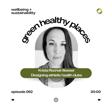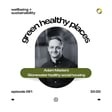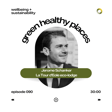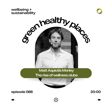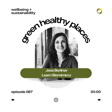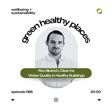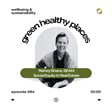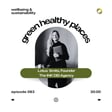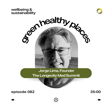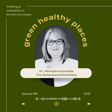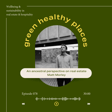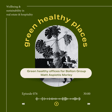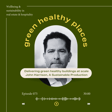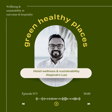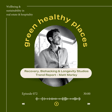Become a Creator today!Start creating today - Share your story with the world!
Start for free
00:00:00
00:00:01

079: Veda Homes / The wellness company that builds homes
In episode 079 of the Green Healthy Places podcast, I am in the UK talking to Dean Jarvis, Founder and CEO of Veda Homes, a residential developer active in the London commuter-belt area with a clear focus on wellness and sustainability.
Dean has a background in finance and launched Veda in 2017, setting out on a mission to combine his own journey towards holistic wellbeing with the need for more healthy, green housing stock for families in the UK.
- https://www.vedahomes.co.uk/
- https://www.instagram.com/vedahomes/
- https://biofilico.com/
- https://www.greenhealthyplaces.com/
Transcript
Podcast Introduction: Well-being in Real Estate
00:00:11
Speaker
Welcome to episode 79 of the Green Healthy Places podcast in which we explore the themes of well-being and sustainability in real estate and hospitality today. I'm your host Matt Morley and in this episode I'm in the UK talking to Dean Jarvis.
Dean Jarvis' Journey: Finance to Sustainable Homes
00:00:29
Speaker
He's the CEO and founder of Vida Homes, a UK-based residential developer
00:00:37
Speaker
focused on all things wellness and sustainability. Dean has a background in finance. He created the company in 2017, setting out on a mission to combine his own journey towards holistic wellbeing with the need for more healthy green housing stock for families in the South of England. So here he is, Dean Jarvis of Vida Homes. Dean, amazing to have you here. Thanks for joining us on the podcast. Thank you very much for having me Matt.
Veda Homes' Unique Lifestyle Approach
00:01:07
Speaker
Why don't we dive in perhaps with a quick sort of overview recap on what you've done so far with the Vader Homes brand since launching in 27 and then perhaps feeding into that also what you've got coming in your project pipeline today. So we get a sense of where you've come from and what you have coming around the corner.
00:01:28
Speaker
Yeah, so Vader Homes, as you say, was founded in 2017. So my property journey actually started before that. So I had a previous incarnation in the city and it wasn't working for me health-wise. And I started to do some property development whilst I was still in the city as a bit of a creative outlet.
00:01:53
Speaker
But VEDA was established to kind of marry my experience in property development with my search for wellness and health because at the time it wasn't serving me to work in the city. So yeah, you ask what we've accomplished. I could sit here and tell you, you know, we've done this project, we've done that project.
00:02:19
Speaker
But fundamentally, what VEDA has accomplished, I hope, in its own little way, over and above other development companies, is to push the envelope on why we live in our homes the way we do and how we can live in our homes better and also how we can build homes better, depending on which side of the coin you're looking at it.
00:02:40
Speaker
We focus on Newbuild residential and yes we've done some lovely sites, we've done some not so good sites where we've made mistakes, but we're growing and we're trying to drive that message forward to be a voice of positive change and just create a bit of ripples in that status quo within the industry I guess.
00:03:03
Speaker
I don't know, what does our pipeline look like today? So we focus predominantly in Surrey and the surrounding home counties. We do have a site in Hampshire. We've got a site down in Sussex. But a London commuter belt is our bread and butter.
Applying Personal Wellness Principles in Development
00:03:20
Speaker
We've got around seven sites at the moment and probably that totals up to about 40, 45 million quid and it's all
00:03:31
Speaker
high quality residential schemes that focus, well, the forefront is sustainability and wellness. What I've seen in the market up to date has been a lot of these concepts and sort of a values-based approach to residential has often been happening at a far larger scale. So we're talking about sort of multi-unit residential towers, typically where
00:04:01
Speaker
the developer can apply some of these sort of well-certification style, wellness real estate concepts at scale and then sort of loop in, fold in various amenities or at a sort of master-planned residential community scale where again, the US has sort of led the way in that sense. What I found interesting about your work is that you're doing it on a much more
00:04:27
Speaker
intimate and personal scale but still applying a lot of those same principles, right? So when you set out to do this, what was the business opportunity that you saw or what was the unmet need perhaps that you identified that was the initial trigger? Because obviously there's your own personal story and then there's what the market was either looking for or there was an unmet need that you decided to fill with this concept. So what was that insight? The insight
00:04:56
Speaker
If we rewind, it wasn't so much me sitting down and saying, okay, how can I create a business that solves a problem? The problem had existed long before that because it was a problem I was facing. As I said, I worked in the city for nearly 10 years and
00:05:16
Speaker
I was miserable. To the outside world, I was successful achieving all this great stuff, chasing imaginary pound notes around on screens. But me as a human was unfulfilled and miserable.
00:05:36
Speaker
I started doing a bit of property as a creative outlet but I really needed to enhance my wellness and so I did a bit of soul searching and actually the story goes that I traveled a bit and I went to India and I bumped into it was an Australian guy by pure chance
00:05:57
Speaker
who knew everything about spatchivade which is an ancient Indian way of building houses and that stems from the Vedas which are old Sanskrit texts. These Sanskrit texts essentially inform us as humans about how we should live in harmony with nature and in a nutshell how we should
00:06:21
Speaker
how to enhance our wellbeing. So it was like a light bulb moment for me at that point where I'd been searching for a way to get well myself, a way to continue with the property journey that I liked and was creative for me, but a way to really kind of lean into my own wellness and providing wellness for other people. So that was where it came from.
00:06:46
Speaker
Um, and yes, you're right that, you know, there's a lot of big schemes out there. All that, I think you put it, they, they weave in wellness and you know, that's, that's all well and good. And I don't want to knock that because clearly doing something is, is better than doing nothing. But a lot of the time it's volume house building with a wellness strategy strapped onto the side.
00:07:12
Speaker
And the way we approach it is in much more of a boutique kind of fashion whereby absolutely everything we do is bespoke and absolutely everything we do is considered from a framework of sustainability and wellness from day one.
00:07:30
Speaker
And so I guess, you know, if you look at the big schemes, you might say they're housebuilders with a wellness strategy strapped onto the side. Arguably, we're a wellness company with a housing strategy strapped onto the side. And that's, you know, the housing is our tool to deliver wellness is the way I see it. I haven't heard it put that way, but I think there is the flip side to larger developers
00:07:59
Speaker
signing up to certification schemes such as well as they do now on a fairly regular basis or obliged to with BRIAM. I think the sort of slight risk to that is that it ends up becoming vanilla because everybody is chasing the same credits and prerequisites and therefore end up doing largely similar things. I think the idea of taking a more bespoke boutique approach is really interesting and perhaps represents
00:08:30
Speaker
what I think of as kind of the second wave in this whole process where people like yourself are starting to feel confident enough to not just box check, but to create their own interpretation of what that means to create a healthy home.
Veda Homes' Business Structure and Customization
00:08:47
Speaker
But you have nonetheless created these sort of four pillars of the business as an initial sort of setting out your stool, right? So before we get into the ethos piece, which is perhaps the nuts and bolts of it,
00:09:00
Speaker
the actual pillars that you have established of the business, perhaps you could just run us through those so we get a sense of how it all fits together. So, yeah, we've got four pillars within the business, VEDA development, VEDA rent, VEDA land and VEDA bespoke. Development is the traditional
00:09:21
Speaker
development process. We identify underutilized land, generally get planning on it ourselves, build the scheme out and then offer it onto the open market for sale. And we generally cover that full breadth of development process. VEDA Rent is
00:09:42
Speaker
as it says on the tin we keep a few units or keep the whole scheme depending on how it works and offer that up to the rental market. Baderland is working with the landowners now that sort of goes hand in hand with development though those two kind of
00:09:58
Speaker
you know, work together because we identify the land in-house, we do that generally, identify the land, speak to the land owner, negotiate with them, get the planning on it, and then it feeds into the development side of the business and to build that out and then sell it. And then the bespoke side is fully bespoke, customized units specifically to an end user's needs.
00:10:26
Speaker
And that's perhaps the bit where I sort of instinctively want to double click, right? Because the others are in a sense, yeah, sort of how you set up the business model and the transaction. And then there's that final bit around the consumer being able to, the consumer, the residents, the future residents, i.e. the buyer, feeding in and working, becoming part of that process. So then that leads us into the ethos, because presumably there is, you've got your fundamentals
00:10:54
Speaker
And that's what you've tried to define around the feeder ethos, right? So you're starting with that, but how much of it is, let's say, essential or obligatory to what you do and how much of it is optional according to what each client asks for or requests? I mean, I wouldn't say there's a tick list that we say, you know, these things are essential because of the way we go about the business and everything being bespoke.
00:11:22
Speaker
And that goes for the development side of the business and the rent side of the business. We're not a volume house builder that just has a house type that we can just rattle out 100 of the same houses and we've kind of predefined this metric and design and all that sort of stuff. Everything is fully bespoke or each scheme is fully bespoke and each building is fully bespoke. So we don't sort of sit down and say, here's our 10 things that we always do because
00:11:51
Speaker
we find it pigeonholes our thought process. It pigeonholes what we're able to do, because it all depends on the site location, the orientation of the site, the type of scheme you're trying to achieve. There's so many different moving parameters on a site by site basis that
00:12:12
Speaker
we wanna have the full arsenal of tools at our disposal. So yeah, the sort of bespoke part of the business that we customize to end users needs is really neat.
00:12:30
Speaker
And yes, it does get the emotional pull for buyers because they get to put a bit of heart and soul into it. But everything we do is custom and bespoke. So yeah, I don't think there's really a set tick list. We just, I think it's so important to have a really, really effective professional team who live and breathe this stuff.
00:12:56
Speaker
so that from day one when you sit down as a design team and say okay you know where we're going to go with this everybody's already already thinking about this.
00:13:04
Speaker
Rather than saying, look, here you go, Mr. Structural Engineer, Mr. Architect, Mr. Whoever, you have to apply our 10 metrics before you get started. Because to an uneducated architect who doesn't understand this wellness and sustainability bit, they're trying to instantly fit a square peg into a round hole from day one. So it then becomes more about
00:13:32
Speaker
team selection and putting together the project team based on their individual expertise. So you're selecting architects, perhaps MEP consultants who have already direct exposure to sustainability and all healthy homes, wellness, real estate. Absolutely. And I think that's absolutely fundamental because then, as I say, you can have a full rounded holistic approach
00:13:58
Speaker
to what you're doing and it forms the framework for every single decision from day one, which means it's the only way to really walk the walk. Otherwise what you're trying to do is grab a strategy that's been formulated, you know, off-site
00:14:17
Speaker
as a generic response to market conditions or somewhere you want to steer a company and you're just trying to plug it in. And it means that the product is not actually necessarily functioning as well as it should be.
Integrating Wellness Features in Home Design
00:14:32
Speaker
You mentioned the wellness aspect then. So how does that, perhaps for someone who's less familiar with the idea of how you integrate health and wellness concepts, strategies into a home,
00:14:42
Speaker
of this scale? What sort of things are you playing with there? What are the levers that you have to increase the health credentials of a home? Well, I mean, you know, we could be here for a couple of weeks if we really want to delve into that. But as I say, you know, it really starts before we've even put pen to paper on what we're going to do. So you need to get down to the site, the proposed site, if you haven't got planning yet. But
00:15:11
Speaker
and really look at track the sun's path across the site, look at the natural features that are there and start to think about the natural environment and how you can position a building in that to leverage all these natural features. Most people are pretty comfortable now with the fact that we need
00:15:32
Speaker
natural light to stimulate serotonin and vitamin D. Most people are pretty comfortable with the idea that we need to de-stress and we need, you know, areas for quiet retreat, all this kind of stuff, or even greenery, you know, when it comes to natural features outside. Most people are pretty, can get their head around the fact that we need time and space in nature to
00:15:54
Speaker
to help our cognitive function and all that kind of stuff. So yeah, from day one, we'll look at the siting of the building, understand the natural features, then work out how we can really integrate a building into that to leverage those natural features.
00:16:09
Speaker
And then that naturally feeds into starting to configure an internal layout. We think about what rooms need sunlight at certain times of day to improve circadian rhythm, improve sleep patterns, decrease stress. So, you know, for example, you might want your master bedroom to face the sunrise rather than the sunset because it means you wake up, your cognitive function increase, you go about your day more productive.
00:16:32
Speaker
as opposed to being flooded with sunlight when you're trying to get some restful sleep. And that goes for every single room we consider the siting of each room, along with obviously how that internal space functions. Size of the windows, again, that feeds back into the vitamin D and the location of the windows, and also what
00:16:53
Speaker
internally, the sunlight falls on. Because if you think about the path of the sun throughout the day and the way the sunlight shines through the windows, what does that then fall on internally in the building? And then once we've got that sort of, I guess the big picture plan sorted, when it comes to construction,
00:17:13
Speaker
We're thinking about how to reduce vibration, reduce sound travel within the building. We actually specify our own timber frame spec to reduce all that. Thinking about low toxic environments, reducing VOCs, using natural materials to leverage that connection with nature. We're big on indoor air quality, so we use indoor air filtration systems.
00:17:40
Speaker
in every house and in fact even before we start designing the properties we do a desktop study on the air quality in the area so we know what we've got to deal with and obviously if it's really bad you know we know we've got to dial up significantly on the tech to clean the air and that comes into planting as well I mean we literally bring the outdoors in you know we're building a scheme at the moment where
00:18:07
Speaker
three houses and they've got trees in the middle, fig trees, they help purify the air and also obviously brings the nature inside to help with cognitive function and all that kind of lovely stuff. So yeah, I mean that's just some of the stuff that we do, it really is a bit of a rabbit hole, you end up
00:18:27
Speaker
the tools at your disposal once you kind of open your eyes to this stuff is massive. But yeah, it's a custom one by one basis, depending on the site. And that's sort of how we go about it. And in terms of the type of customer client that you're attracting on that basis, would you say there's a dominance of a certain demographic or psychographic? Does it tend to be families who perhaps have kids with allergies or
00:18:57
Speaker
People who are particularly dialed in and tuned in to all of these elements? Or is it people who just live a healthy lifestyle? What are you seeing in terms of the customer consumer feedback on your product effectively?
00:19:10
Speaker
That's a good question. The feedback is actually largely, I've never had bad feedback, but the demographic is quite wide and the reason the demographic is quite wide is that we generally have to educate people. I don't think education around this sort of stuff is necessarily
00:19:37
Speaker
widespread or that available. So what we find is that we have customers coming to us or who have seen our product or been recommended or whatever who are just looking for a home. They don't really understand the wellness bit but they they come to us and we explain it to them and they
00:20:01
Speaker
go, well, of course I want a house that looks just as good. Arguably, I would say better than other houses. But by the way, you're going to live happier and longer. Of course I want that. Why would I not want that?
00:20:15
Speaker
Yeah, there needs to be, in my opinion, a lot more education and information out there in order for people to start choosing this rather than coming in contact with this sort of product. And then, you know, we sort of get the hooks in them after they've come in contact with the product, if that makes sense, which is a real shame because
00:20:40
Speaker
You know, we spend a lot of time, a lot of money, you know, a lot of effort doing this stuff. And at the moment, it feels like it's more the sort of tipping balance to get a deal over the line as opposed to something that people really, really seek. Do you think that's all to do with the market? Is it perhaps the type of marketing
00:21:09
Speaker
and communications that you're doing at the moment? Yeah, I definitely think that we've got a marketing strategy or we want to formulate a new marketing strategy to really, really go heavy on it. I do think there's a lot to do with the market as well. I mean, let's face it in the UK,
00:21:27
Speaker
You know there's significant housing pressures, and for a lot of people, wellness is just not on the agenda, you know if you've got a growing family and you need an extra bedroom because you've got a baby on the way.
00:21:42
Speaker
you're looking for a house and you're saying, how many bedrooms has he got? How many bathrooms has he got? And when I say, okay, yeah, but what about the air filtration, the MVHR unit? They're saying, well, quite frankly, I don't care. I just need places to fit my kids because we're all over the place and our standard of life is not very good. So there's
00:22:02
Speaker
There's housing pressures that sadly for a lot of people take precedent and I think what that's kind of forced us into is dealing with the higher end of the market where there's potentially a bit more cash to spend on the luxury stuff.
00:22:22
Speaker
And that's not necessarily by design, you know, this founding the business is not about just providing wellness to those who can pay for it, of course it isn't, but naturally with those pressures, you know, there's that zone at which, you know, people just can't afford to spend money on something. And for us, you know, the technology is expensive.
00:22:45
Speaker
We could stack them high and sell them cheap as good as the next person, but then we're just another volume house builder and that's not what we want to be. So trying to create something that harnesses wellness and is sustainable
00:23:04
Speaker
OK, you don't have to you don't have to spend a fortune, to be honest, it's more about attention to detail. But but yeah, there's there's there's a certain limit to it, to where you can go with it, which is which is sad. And there's some things that we hopefully over the sort of medium to long term want to address and start building more.
00:23:27
Speaker
what's the word, more price-friendly stuff, you know, going into the sort of middle and lower markets if we can. I don't know, really, over the long term I would love to do some social housing stuff, but we'll see where that gets to. Often where the most serious problems unfortunately emerge, particularly around material choices on cladding and interior fit outs and
00:23:53
Speaker
from paints to the insulation that gets pretty nasty unfortunately still despite improvements in regulations building code etc so yeah there's a lot to do there that would be interesting to see how you move and diverge in both up with the market but also down perhaps some sort of repositioning business around that but tell me at the moment what have you got in terms of your team structure in-house versus externally so you've obviously got
00:24:22
Speaker
There's yourself and whoever else is with you as a full-time basis. And then how have you built it? Have you built this based on keeping it lean and light and then you sort of bring in consultants on a project basis or have you built a sort of head office team that leads on certain elements of every project? What's the structure that you found has worked best so far?
Lean Structures for Wellness Focus
00:24:45
Speaker
I've built it purposely lean.
00:24:51
Speaker
We've had headaches, nonstop headaches with planning and actually more recently some site acquisition stuff. It seems the world has gone a bit mad post COVID and it's very, very hard to get things through. So we, you know, out of the seven sites we currently have on the go, five of them are planning and have been there quite some time.
00:25:20
Speaker
and so the lean structure with minimal overheads, we do obviously have overheads, we do have you know staff internally but not a huge number, that lean structure enables us to weather the storm and be nimble when it comes to strategy and how we move forward. In terms of the external team, so you say yes we use
00:25:44
Speaker
a number of external consultants as I said they're chosen specifically for their expertise in low carbon structures or wellness etc and actually we've we've built a pretty good team
00:26:01
Speaker
over the last couple of projects that I would say is about as effective as I can expect them to be. They're really, really, really good. So I'm happy with them and we'll move forward with them for the time being because everyone understands the product.
00:26:21
Speaker
which is really good and everyone's putting in the same direction and everyone's passionate about it and that's fundamentally I think the biggest thing for me and I actually quite like dealing with outside consultants who have made it their mission to
00:26:37
Speaker
to sort of dial up the sustainability and wellness bit because they're self starters you know they're like they're like me they're like you they're people who genuinely have a passion for it rather than me going out and offering a job to somebody and saying hey look you know we're at we're a company who builds
00:26:55
Speaker
homes and property that enhances wellness and sustainability and somebody just applies for the job because it's a paycheck. So I guess there is a plus side to dealing with other self-starters because they really live and breathe it. Yep, that makes total sense. You mentioned the idea of potentially looking at social housing at some point further down the line
00:27:20
Speaker
In terms of building out the brand from here, just a final question to close on, how do you see it evolving or developing into new sectors or into new markets over the next few years?
Future Aspirations: Social Housing and Systemic Change
00:27:32
Speaker
When you look down the pipeline for your imaginary five to 10 year plan, what else can you see incoming? What would you like to see?
00:27:42
Speaker
I mean the first and foremost one is do more of what we're doing and like I say push into the middle market and social housing market. I really would love to be able to deliver this across the abroad spectrum. It's going to take political change, I think it's going to take some systemic change but
00:28:03
Speaker
I don't know, I do feel like change is in the air. It might probably be slow, given it's the property market, but nonetheless, that would be, you know, over the next five, 10 years, I would really love to do that. And we're also actually going to push into the leisure sector. So we're working on a site down in the new forest at the moment, which has been
00:28:30
Speaker
again a bit of a long one appeal process all the rest of it but that was going to be or still is going to be because we've now won it on appeal but we're going to use that as a bit of a test pilot into leisure and start
00:28:45
Speaker
creating or really dialing up the VEDA principles on wellness nature, all that kind of stuff with a leisure facility. So sort of an outdoor hotel wellness facility.
00:29:00
Speaker
and so we've got that in the pipeline at the moment as a bit of a test pilot but it's probably too small to really put a put a stamp on it but yeah five to ten years I'd like to have something something pretty good going there so very cool well it'll be fascinating to see how how it all develops over the next few years congrats on what you've achieved so far it's no easy task especially how the market's been over the last few years but you've
00:29:28
Speaker
you've weathered the storm and seem to have come through guns blazing. So how can people follow along? What platforms are you most active on social media? What's your website? Website is vaderhomes.co.uk. Instagram is at vaderhomes. They're probably the two primary channels or drop us an email info at vaderhomes.co.uk. We're always happy to speak to people. Very cool. We'll add all that into the show notes.
00:29:58
Speaker
Amazing, thanks for your time. Thanks Matt, thank you.
